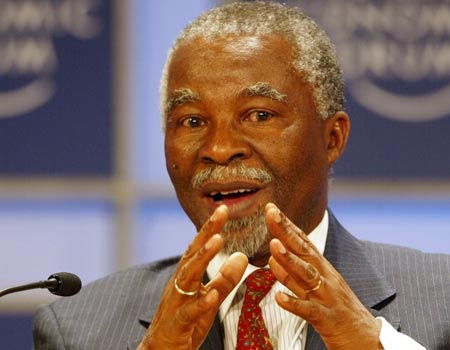Former South African President, Thabo Mbeki has recommended virile, conscientious and upstanding youth organisations if Africa is to experience the much desired developments in various countries and sectors that make up the continent.
The South African leader stated this while featuring on the Toyin Falola Interview series held virtually on Sunday and put together by erudite scholar and professor of African history, Toyin Falola, with his operational base at the United States of American. The Toyin Falola Interviews have been particularly tilted towards amplifying African voices with the intent to provide a deep pool of solutions to the many problems plaguing the African continent, on one hand, and also to celebrate Africa’s emerging successes.
In this edition, the panel of interviewers, led by Professor Falola, had accomplished academic, Professor Paul Zeleza and journalist, Naledi Moleo.
Reacting to a wide range of issues, Mbeki asserted that young people formed a core of the solutions needed in addressing many African issues. According to him, “What is important about the involvement of young people in terms of political leadership is that young people themselves should build very strong, conscientious youth organisations to be very active. These youth organisations should be very active in addressing some of these challenges: unemployment, bad governance, bad politics. That is how they become, not just leaders of the youths, but leaders of the nations. We need organized, conscientious active youth organisations to build Africa.”
ALSO READ FROM NIGERIAN TRIBUNE
Tracing his trajectory in South Africa’s politics and leadership, he informed his audience that growing up with a political consciousness was systemic. “My generation was fortunate in that we joined the African National Congress (ANC) at a young age. For instance when I joined, I was thirteen and a half years old. From then on we had engaged with these issues of apartheid, development of Africa, policies and many others. We grew up in the movement. By the time the members of the youth league elected me to part of the executive which was part of the leadership of the youth league. So it was not a handing over from somebody; it was part of the natural process of growing in the youth league. After you get elected, some may say that this one is good enough to be a part of the executive committee.
Much later in our lives, we were given more responsibilities like say being the ANC’s representative in other countries. For instance in 1975 when I was told that I had been co-opted into the national executive of the ANC, it was because I had been working in the ANC right from time. A vacancy opens and I was asked to fill in. there was a time when eight leading members of the congress left and their departure left a major vacuum in the ANC. But there were certain tasks that had to be done. We were the next group of people. We were approached by the leadership to fill the slots. We resisted that. But there was nobody else and the leadership insisted. Again it was not a handing over but a matter of progression through the ranks of the movement.
“I knew Mandela and worked with him when I was 19 years old. He used to call me to his house; we engaged in conversations. What I didn’t know was that he was testing me on the issues they had discussed at the leadership of the ANC. It is a continuing process; there is no sense of a baton being handed over. It was a systemic growth,” he said.
Mbeki who turned 80 on Saturday, June 18, 2022, enthused his greatest moment was his partaking in the fruitful struggle which ended the apartheid regime in South Africa.
“We are proud of liberation; that we engaged in a struggle that defeated the apartheid regime and system. That is a very good and wonderful achievement for many of us. After its liberation, South Africa tried to make its contribution to the very historical task of the development of the African continent. The apartheid system was very offensive. It was everybody’s engagement who wanted the liberation of South Africa. And necessarily as a consequence of that, there were many expectations that once South Africa was free, it would provide space for many other things to happen.
“We tried to do what we could to make our own little contributions to the challenge of development in Africa. I think that is an achievement. I must also say that it was a period when the rest of the world treated Africa with some respect. That is why, for instance, we were in agreement with what was the G8 on what became the G8 African Plan. We worked with them on that and said to them that they must base their engagements on what the Africans want as development and not impose on Africa what they felt was needed as development. They agreed. It was a particular moment when the rest of the world was listening to what Africa was saying. We must go back to that period,” he stated.
During the session, Mbeki touched on issues surrounding liberation and post-independence South Africa, key challenges experienced while he was in office, constitutional reforms and the impact of reform programs during the Nelson Mandela administration.
The interview was streamed live on various social media platforms and was viewed by many representatives of the African Union and 31 countries on television and radio stations; thirteen heads of state were reportedly connected on a special link.






